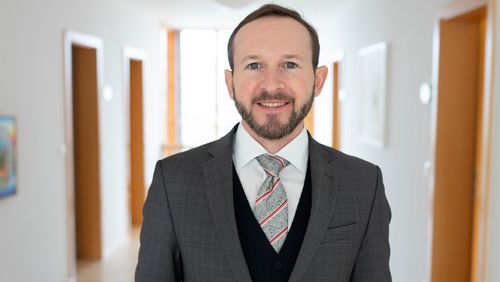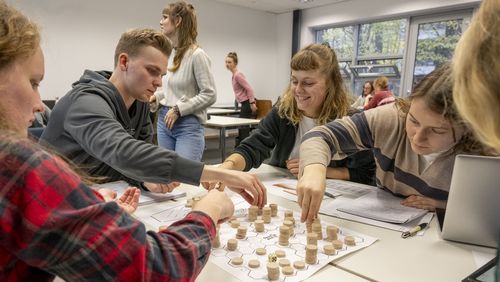Adaptation strategies are needed to mitigate the consequences of climate change. But policymakers are often hesitant to act. In this interview, political scientist Nicolas Jager talks about entrenched structures and why the UN climate change conference in Glasgow also matters on a regional level.
Mr Jager, you work on so-called policy lock-ins relating to climate adaptation strategies. What is this about?
We wonder why there is only limited or often hesitant climate adaptation policy happening - even though it is clear that the climate is changing and consequences such as floods or droughts are already being felt. The lock-in approach assumes that we are stuck in a so-called path-dependent system. This means that previous events or decisions are self-reinforcing in such a way that established practices and paradigms become robust to change, making alternatives for action less likely.
What does this mean in concrete terms?
A staggering example is the flood disaster of the river Ahr. Here - even after the terrible events of the summer - the forces of persistence are so great that the vast majority of the destroyed houses are to be rebuilt in the same place. In such cases, politics is stuck in a vicious circle. In order to break out of these vicious circles, we need to know how institutional systems, built infrastructure, people’s behaviour and habits reinforce each other. We are identifying and analysing these blocking mechanisms and processes in the Adapt Lock-in project.
The 26th UN Climate Change Conference is currently taking place in Glasgow, Scotland. Experts have little hope that the participants will agree on effective climate protection measures. Are we dealing with a lock-in?
The more encrusted structures are, the more difficult it is to break them up. Nevertheless, entrenched lock-ins can even be reversed into a positively reinforcing mechanism. In Paris, for example, the urban traffic system has been transformed in a short period of time over the past few years: the city has built new cycle paths, promoted cycling and recently even closed busy streets to car traffic - with positive results for cycling and the city climate. This creates a dynamic in which even more far-reaching urban and transport planning transformations, such as the currently discussed idea of the "15-minute city", appear to be quite realistic and feasible.
So once the first step has been taken, it becomes easier...
Yes, but in international negotiations the situation is of course even more difficult. Here it is not only about breaking up entrenched systems, but also about the negotiating dynamics, political positions and other questions, for example about burden sharing: Which countries bear which costs?
What does that mean for policy at national or even regional level?
What happens in Glasgow will in any case have national and regional impacts. Because regardless of the actual decisions made, the conference is important for setting the agenda: How is the topic of climate protection and climate adaptation framed there? As rather problematic or, for example, as an opportunity for innovation? So, on the one hand, an international decision can be an impetus and impulse to break up entrenched structures, but on the other hand, failure can also hamper national and regional efforts.
What are you specifically dealing with in your project?
We are looking at examples of existing adaptation strategies in Germany, the Netherlands and the UK. We are looking at different areas that are already affected by climate change, such as biodiversity, water scarcity, mental health, coastal protection or forests. We want to understand which rules and habits, but also physical infrastructure, exist that could stand in the way of a climate adaptation strategy.
What are the challenges in coastal protection, for example?
One of our case studies deals with coastal management in Schleswig-Holstein. Here, as in Lower Saxony, there is an infrastructure that has grown over centuries and is deeply rooted in our society: the dike. This has even manifested itself in literature – namely Theodor Storm's 19th century novel "Der Schimmelreiter". People live behind dikes, they are part of our culture. The main adaptation measure in coastal protection is therefore usually increasing the height of the dike. Alternative adaptation measures feature less prominent in the discourse. There are also institutional aspects that inhibit change: For which adaptation measures is money made available at all? What funding pots are there? What type of knowledge do coastal protectors use? It has been shown that above all the technical view, that of the engineers, is predominant. However, approaches are also changing. For example, the Wadden Sea National Park has made people turning their attention also to the area in front of the dike, and not just the dike itself. That step has changed the composition of interests.
What is the next step?
We first try to understand the system on the ground by analysing policies or laws. We also talk to decision-makers or stakeholders to look behind the scenes and understand why certain decisions are made. If we understand the systems better, potential starting points can be identified to break up particularly encrusted structures in order to set impulses for the future. These diagnostic case studies are now almost complete. We are now comparing the case studies and investigating whether we find patterns or similar causes for lock-ins. At a conference next spring, we will exchange views on this with our partners. In this way, we also want to draw general conclusions and develop recommendations for policy and further research together with other researchers and stakeholders from the field.
Interview: Constanze Böttcher

![[Translate to English:] Storm surge in Wilhelmshaven](/fileadmin/_processed/f/8/csm_sturmflut_iStock-1205338854_Steffen_F_2dc32ac1a3.jpg)


